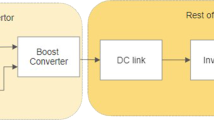Abstract
Maximum power point (MPP) technique in photovoltaic (PV) systems implements a tracking controller, which is utilized to optimize the energy production under variable atmospheric conditions. The tracking process becomes more difficult due to appearance of many peaks owing to partial shading conditions. Although conventional and soft computing technologies are frequently used to solve MPP tracking issues, their performance is constrained by the fixed step size of conventional methods. However, once soft computing methods reach a certain MPP, they are constrained by a lack of randomness. The novel adaptive flower pollination algorithm (AFPA) optimization technique proposed in this work, proceeds with global and local searching in a single step, which is very crucial for the success of the MPP tracking with this method. The robustness of the approach is examined by conducting zero, weak, moderate, and strong shading patterns to a complete performance assessment via simulation, and that performance is compared with traditional flower pollination algorithm (FPA) and particle swarm optimization (PSO) techniques. This newly proposed method has the following advantages over the conventional FPA: a) risk of failure is zero; b) oscillation of power, voltage, and current across the load is minimized; c) produced energy is increased by 0.5 to 2.5% with respect to FPA; d) MPP is tracked smoothly and e) reduced MPP tracking time by average 45%. This advantage is especially noticeable in the dynamic variation of the shading patterns.


















Similar content being viewed by others
References
Bahari MI, Tarassodi P, Naeini YM, Khalilabad AK, Shirazi P (2016) Modeling and simulation of hill climbing MPPT algorithm for photovoltaic application. In: 2016 International Symposium on Power Electronics, Electrical Drives, Automation and Motion (SPEEDAM) (pp 1041-1044). IEEE.
Chowdhury SBR, Gayen PK, Roy S, Babu NV (2022) A Novel MPPT algorithm for PV systems under variable shading conditions using horse herd optimization. J Electr Syst 18(1)
González-Castaño C, Restrepo C, Kouro S, Rodriguez J (2021) MPPT Algorithm Based on Artificial Bee Colony for PV System. IEEE Access 9:43121–43133. https://doi.org/10.1109/ACCESS.2021.3066281
Hayder W, Ogliari E, Dolara A, Abid A, Hamed MB, Sbita L (2020) Improved PSO: A comparative study in MPPT algorithm for PV system control under partial shading conditions. Energies. https://doi.org/10.3390/en13082035
Li H, Yang D, Su W, Lu J, Yu X (2019) An overall distribution particle swarm optimization MPPT algorithm for photovoltaic system under partial shading. IEEE Trans Ind Electron 66:265–275. https://doi.org/10.1109/TIE.2018.2829668
Mohanty S, Subudhi B, Ray PK (2016) A new MPPT design using grey Wolf optimization technique for photovoltaic system under partial shading conditions. IEEE Trans Sustain Energy 7:181–188. https://doi.org/10.1109/TSTE.2015.2482120
Mosaad MI et al (2019) Maximum power point tracking of PV system based cuckoo search algorithm; review and comparison. Energy Procedia. 162:117–126
Nieto AE, Ruiz F, Patiño D (2019) Characterization of electric faults in photovoltaic array systems. DYNA 86:54–63
Ram JP, Babu TS, Rajasekar N (2016) Fpa based approach for solar maximum power point tracking. In: 2016 IEEE 6th International Conference on Power Systems (ICPS) (pp 1-6). IEEE. https://doi.org/10.1109/ICPES.2016.7584046
Prasanth Ram J, Rajasekar N (2017) A novel flower pollination based global maximum power point method for solar maximum power point tracking. IEEE Trans Power Electron 32:8486–8499. https://doi.org/10.1109/TPEL.2016.2645449
Rahman MM, Islam MS (2020) PSO and ANN based Hybrid MPPT algorithm for photovoltaic array under partial shading condition. Eng Int 8:9–24
Ram JP, Pillai DS, Ghias AMYM, Rajasekar N (2020) Performance enhancement of solar PV systems applying P & O assisted Flower Pollination Algorithm ( FPA ). Sol Energy 199:214–229. https://doi.org/10.1016/j.solener.2020.02.019
Safari A, Mekhilef S (2011) Incremental conductance MPPT method for PV systems. In: 2011 24th Canadian Conference on Electrical and Computer Engineering (CCECE) (pp 000345-000347). IEEE. https://doi.org/10.1109/CCECE.2011.6030470
Sharma A, Sharma A, Jately V, Averbukh M, Rajput S, Azzopardi B (2022) A Novel TSA-PSO based hybrid algorithm for GMPP tracking under partial shading conditions. Energies 15(9):3164. https://doi.org/10.3390/en15093164
Sundareswaran K, Peddapati S, Palani S (2014) Application of random search method for maximum power point tracking in partially shaded photovoltaic systems. IET Renew Power Gener 8:670–678. https://doi.org/10.1049/iet-rpg.2013.0234
Titri S, Larbes C, Toumi KY, Benatchba K (2017) A new MPPT controller based on the Ant colony optimization algorithm for Photovoltaic systems under partial shading conditions. Appl Soft Comput J 58:465–479. https://doi.org/10.1016/j.asoc.2017.05.017
Yetayew TT, Jyothsna TR, Kusuma G (2016) Evaluation of Incremental conductance and Firefly algorithm for PV MPPT application under partial shade condition. In: 2016 IEEE 6th International Conference on Power Systems (ICPS) (pp 1-6). IEEE. https://doi.org/10.1109/ICPES.2016.7584089
Yousri D, Babu TS, Allam D (2019) A novel chaotic flower pollination algorithm for global maximum power point tracking for photovoltaic system under partial shading conditions. IEEE Access 7:121432–121445. https://doi.org/10.1109/ACCESS.2019.2937600
Youssef AR, Mousa HHH, Mohamed EEM (2020) Development of self-adaptive P&O MPPT algorithm for wind generation systems with concentrated search area. Renew Energy 154:875–893. https://doi.org/10.1016/j.renene.2020.03.050
Zaki AA, Rezk H (2017) Global MPPT based on flower pollination and differential evolution algorithms to mitigate partial shading in building integrated PV system. Sol Energy 157:171–186. https://doi.org/10.1016/j.solener.2017.08.024
Acknowledgements
The authors acknowledge the Department of Science and Technology (DST), Govt. of India for the financial assistance provided under DST SERB Project (File No. SRG/2021/002110) to carry out the present work. Dr. Amitesh Kumar would like to thank DST SERB for providing Start-up Research Grant under this project to carry out research work at NIT Patna. Mr. Balmukund Kumar would like to thank NIT Patna for research facilities and the Ministry of Education, Govt. of India for the research fellowship.
Author information
Authors and Affiliations
Corresponding author
Rights and permissions
Springer Nature or its licensor (e.g. a society or other partner) holds exclusive rights to this article under a publishing agreement with the author(s) or other rightsholder(s); author self-archiving of the accepted manuscript version of this article is solely governed by the terms of such publishing agreement and applicable law.
About this article
Cite this article
Kumar, B., Kumar, A. A Novel Adaptive Flower Pollination Algorithm for Maximum Power Tracking of Photovoltaic Systems Under Dynamic Shading Conditions. Iran J Sci Technol Trans Electr Eng (2024). https://doi.org/10.1007/s40998-024-00696-z
Received:
Accepted:
Published:
DOI: https://doi.org/10.1007/s40998-024-00696-z




